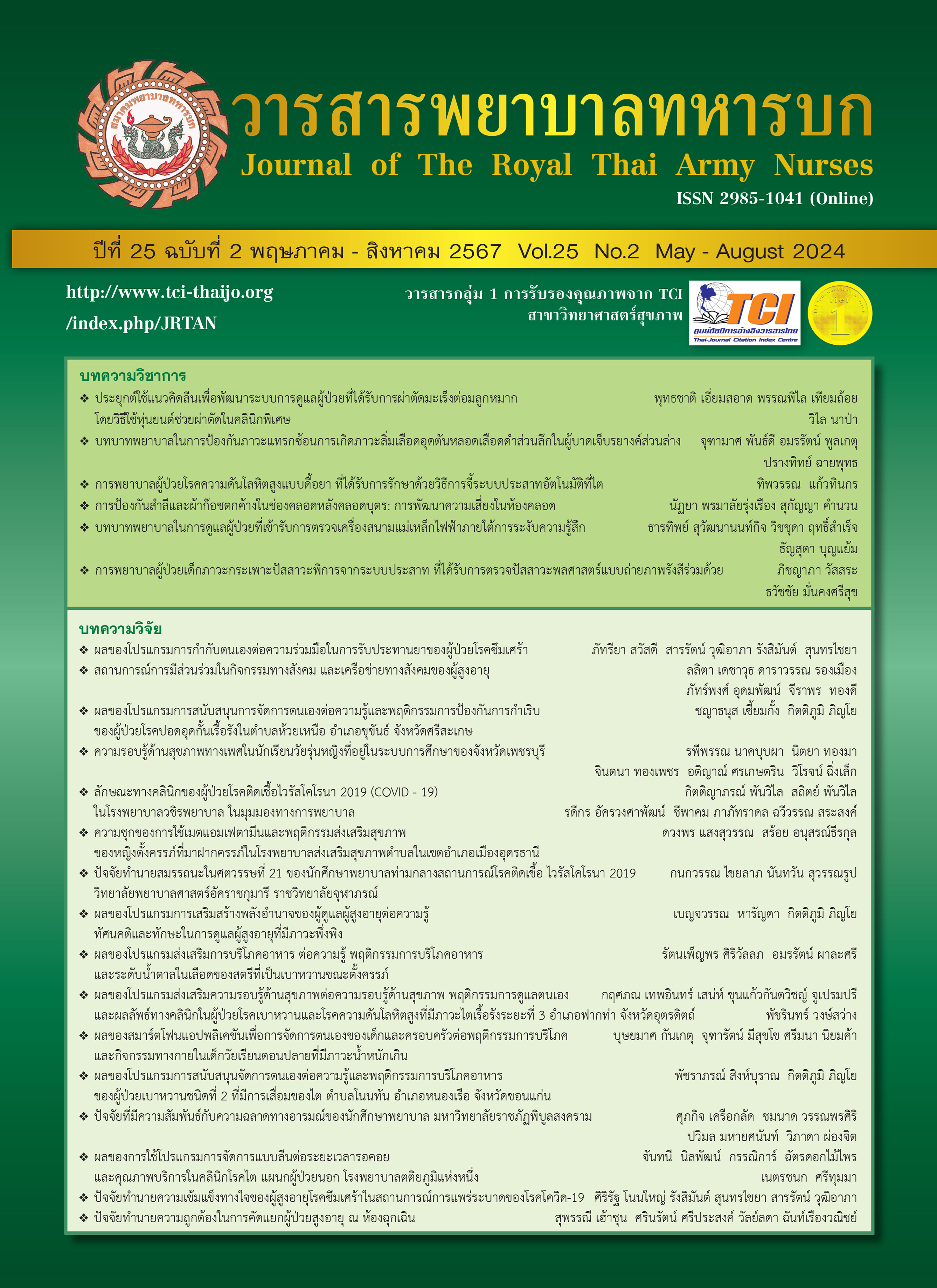Effectiveness of a Self-Care Promotion Program Using Wireless Technology for Patients with Pulmonary Dysfunction due to COVID-19 Infection During Home Rehabilitation, Suphanburi Province
Keywords:
Knowledge and behavior program, lung function problems, Covid 19 Infected, HomeAbstract
This research is a quasi-experimental study with a two-group pretest-posttest design to compare the average scores of knowledge and self-care behavior after contracting Coronavirus Disease 2019 (COVID-19). The sample consisted of patients in the yellow group who had lung function problems due to COVID-19 infection. Each group comprised 50 participants, selected through purposive sampling and divided into an experimental group and a control group, totaling 100 participants. The instrument used was a self-care knowledge promotion program utilizing wireless technology, which assessed the knowledge and behavior of patients after COVID-19 infection. Descriptive statistics were used to analyze general data through frequency distribution, percentage, mean, and standard deviation, while inferential statistics were used for comparison analysis with the t-test.
The research findings revealed that: 1) Patients who received the program had significantly higher self-care knowledge after the experiment at the .05 level of significance. 2) Patients who received the program exhibited significantly better self-care behavior after the experiment at the .05 level of significance.
Recommendations: The research results can be applied, and further studies should follow up on patients’ behaviors in preventing COVID-19 after receiving the program in the long term to assess the program’s sustainability.
Downloads
References
World Health Organization. Report of the WHO-China Joint Mission on Coronavirus Disease 2019 (COVID-19). 2020. (in Thai)
Pratipanawat P. Factors of Affecting fatality with COVID-19 patients in Kalasin Hospital. Journal of Health and Environmental Education. 2022; 7(1): 64-71. (in Thai)
Ballestero MFM, & de Oliveira RS. The covid-19 outbreak and pediatric neurosurgery guidelines. Arch Pediatric Neurosurg 2020; 2(1): 53-4.
Witoonsakul P, Chaisuwan C, & Rungamornrat S. Factors Influencing Behaviors in Preventing COVID-19 of Teachers and Caregivers in Child Care Centers. Journal of Nursing Science. 2021; 3(9): 41-54. (in Thai)
Kunlarat Chamninork, Aree P, & Lamchang S. Related Factors of Maternal Practices for Recurrent Pneumonia Prevention Among Children. Nursing Journal. 2020; 47(1): 77-87. (in Thai)
Soontorn K. Factors Associated with Symptoms of COVID-19 Patients in the Huairat Hospital, Buri Ram Province. Medical Journal of Srisaket Surin buriram Hospitals. 2023; 38(1): 21-31. (in Thai)
Rerkluenrit J, Panpakdee O, Malathum P, Sandelowski M, & Tanomsup S. Self-care among Thai people with heart failure. Thai Journal of Nursing Research, 2009; 13(1): 43-54. (in Thai)
Orem D E, Taylor S G, & Renpenning K M. Nursing: Concepts of practice (6thed.). 2001. St. Louis: Mosby.
Department of Health. Separating patients into 3 colors as a quick treatment option and reducingpain. 2023. (in Thai)
Faul F, Erdfelder E, Lang, A.G, & Buchner, A. G*Power 3: Aflexible statistical power analysis program for the social, behavioral, and biomedical sciences.Behavior research methods, 2007; 39(2): 175–91.
Polit D F. Statistics and data analysis for nursing research (2nd ed.). United State of America: Ewards Brothers. 2010.
Likert R. New Pattern of Management. New York: McGraw – Hill. Lipham, 1961.
Best J. W., & Kahn J. V. Research in Education. 9th Edition, Prentice-Hall of India Private Limited, New Delhi. 2003.
Changtong K, Narin R, and Aungwattana S. Effects of the Learning Enhancement Program on Knowledge and Caring for Lung in Groups at Risk for Chronic Obstructive Pulmonary Disease. Christian University Journal. 2023; 6(9): 28-42. (in Thai)
Panya S, Koomala S, & Khoyun S. The Relationships among Self-Efficacy and Satisfaction of Nursing Students who Received Online Learning in COVID-19 Situations. Journal of the Royal Thai Army Nurses. 2021; 22(2): 141-48. (in Thai)
Sanongyard J. The Effects of Animation Innovation toward Knowledge and Self-care Behaviors in Infection Control of Covid 19 of Primary School Children. Journal of Bamrasnaradura Infect. 2024; 8(1): 46-57. (in Thai)
Downloads
Published
How to Cite
Issue
Section
License
Copyright (c) 2024 Journal of The Royal Thai Army Nurses

This work is licensed under a Creative Commons Attribution-NonCommercial-NoDerivatives 4.0 International License.
บทความหรือข้อคิดเห็นใดใดที่ปรากฏในวารสารพยาบาลทหารบกเป็นวรรณกรรมของผู้เขียน ซึ่งบรรณาธิการหรือสมาคมพยาบาลทหารบก ไม่จำเป็นต้องเห็นด้วย
บทความที่ได้รับการตีพิมพ์เป็นลิขสิทธิ์ของวารสารพยาบาลทหารบก
The ideas and opinions expressed in the Journal of The Royal Thai Army Nurses are those of the authors and not necessarily those
of the editor or Royal Thai Army Nurses Association.






